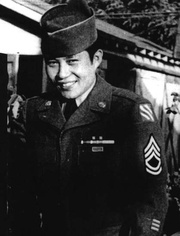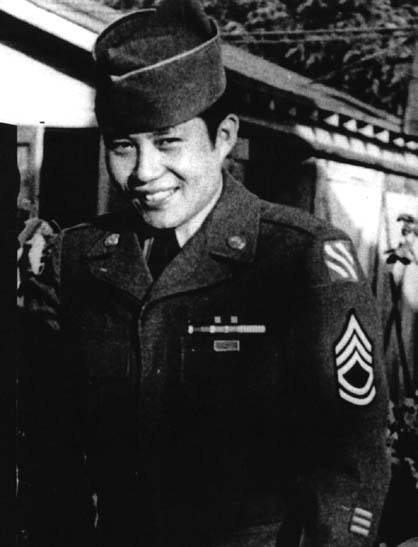
日系アメリカ人兵役体験記録データベース

Roy Hiroshi Mayeda
性別
Male
生年月日
1929-8-6
出生地
Santa Maria CA, U.S.A.
入隊した年
1948-8-13, Watsonville CA
入隊のタイプ
Volunteer
所属・部署
Army
兵役のタイプ
War,peacetime
所属部隊のタイプ
Combat
所属部隊
69th Chem Smoke Gen Co. (Spec Combat Unit, Korea). Unit was attached to 1st Marine Div. in Korea. Our small spec. unit provided smoke screening at Inchon Landing, crossing Han River, etc.
特殊技能
1. Squad leader, 2. Motor pool sgt. (later) (Responsible for all unit's rolling stock.)
最終目標
U.S.A. - Kentucky, CA, Maryland; Japan; Korea (combat)
除隊した年
Ft. Ord CA
所属部隊の役割
Korea 1950 - Our special unit provided smoke screen cover - amphibious assault, Inchon 1st Marine Division - crossing Han River. Airfield, ammo dumps, etc.
主な戦闘(交戦地帯へ従軍した場合)
I was involved in five major battles (Korea 1950 - 51). Most notable: amphibious landing at Inchon - 1950 , Seoul and retreat from North Korea (Chosin Reservoir area to Hungnam).
勲章・褒章(個人又は所属部隊)
Five Bronze Battle Stars ; Meritorious Unit Citation; Good Conduct Medal; Honorable Discharge.
生活状況
In North Korea - conditions were absolutely horrible. I didn't get to shower once in 3 months. The weather, the cold was so severe - guys were crying it hurt so bad. Canned food froze. Sleeping was almost impossible - too cold (outdoors).
軍隊生活で最も記憶に残っている出来事
(Deep in North Korea - 1950) Our worst nightmare happened when the Chinese Communists had us surrounded. (We heard 300,000 of them). The weather was a severe factor already, frigid killing cold - minus 30 degrees plus Siberian wind. It was just about the worst predicament a man can be in. We all knew we were not going to see home again, and that this might be the very worst place to die. (I'm not sure) But I believe we were near Chinghung-ni (North Korea) at the time. The 1st Marine - 1st battalion was along the hill and the 155 howitzers were in the river bed. About this time our unit was told to hurry back to Hungnam. (We knew what was up). We had to provide smoke screen cover for the troops getting off the beach on to ships. Morale was bad. We knew we might be the last to leave the beach. All of a sudden orders came down, again, to hurry to a strategic airfield in South Korea. We loaded up on C-119's and got out. Thank God, that was real close. We almost bought the farm.
軍隊にいる間、最も懐かしかったもの
The four years I served, every unit I was in, I was always the only oriental. I missed the compaionship of a Nisei guy and also Japanese food. I was real homesick.
個人的に軍隊経験から学んだ最も重要なこと
I know that for Japanese Americans, life in this country has been far from ideal. You could do everything right but still be accepted as third class citizen. Volunteering into the service did not change this, but down deep I do feel good that (I) served my country honorably.
その他の情報
(As corny as this might sound, but it's true) I volunteered into the service of this country because I wanted to show and prove to the United States that I am as good American as anyone. You would think being in the same uniform would eliminate some prejudices against Japanese-Americans. Unfortunately, this was not true. Being the only Japanese-American in all the units I served, I experienced blatant prejudices. In promotion, citations, put on very dangerous assignments, etc. etc.


